There's a quickening in the air this time of year, as the (Northern Hemisphere) calendar turns toward spring. Buds are swelling on the trees; the light lingers a minute or two longer each afternoon. And though we still may get snow here in the Northeast, brave green spears--crocuses, snowdrops, even a few early tulips--are pushing up through the half-frozen ground. As I watch for blooming trees and blue skies, I'm reaching for books that both reflect the changes I'm seeing in the natural world, and remind me to pay attention to them.
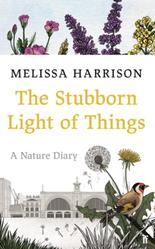 Novelist and naturalist Melissa Harrison writes a monthly Nature Notebook column for the Times (U.K.). Her lyrical book The Stubborn Light of Things (Faber & Faber, $19.95) collects some of those columns, tracing Harrison's journey from married Londoner to solitary rural-Suffolk dweller. She muses on birds, beasts, wildflowers, and changing light, and takes readers along on her rambles through parks and fields. (Harrison recorded a spinoff podcast of the same name throughout 2020, chronicling her solitary walks through the changing seasons in the early months of Covid-19.)
Novelist and naturalist Melissa Harrison writes a monthly Nature Notebook column for the Times (U.K.). Her lyrical book The Stubborn Light of Things (Faber & Faber, $19.95) collects some of those columns, tracing Harrison's journey from married Londoner to solitary rural-Suffolk dweller. She muses on birds, beasts, wildflowers, and changing light, and takes readers along on her rambles through parks and fields. (Harrison recorded a spinoff podcast of the same name throughout 2020, chronicling her solitary walks through the changing seasons in the early months of Covid-19.)
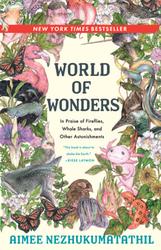 Poet Aimee Nezhukumatathil pays keen attention to the natural world in her debut essay collection, World of Wonders (Milkweed, $25). From the axolotl to the whale shark to the magnolia trees that dot the campus of the University of Mississippi, where she teaches, Nezhukumatathil draws vivid portraits of flora and fauna alongside reflective accounts of her own experience. Featuring some of nature's more outlandish "wonders," the collection captures the mingled awe and comfort Nezhukumatathil has always found in the natural world. It inspires me to look out my own window: there are no narwhals (that I know of) in Boston, but I wonder what else I might be missing.
Poet Aimee Nezhukumatathil pays keen attention to the natural world in her debut essay collection, World of Wonders (Milkweed, $25). From the axolotl to the whale shark to the magnolia trees that dot the campus of the University of Mississippi, where she teaches, Nezhukumatathil draws vivid portraits of flora and fauna alongside reflective accounts of her own experience. Featuring some of nature's more outlandish "wonders," the collection captures the mingled awe and comfort Nezhukumatathil has always found in the natural world. It inspires me to look out my own window: there are no narwhals (that I know of) in Boston, but I wonder what else I might be missing.
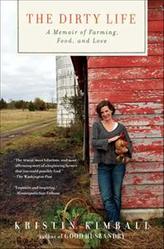 Kristin Kimball never expected to hang up her high heels and trade in her shiny Manhattan existence for a life digging in the dirt. Yet that's exactly what happened: today, Kimball runs Essex Farm on Lake Champlain with her husband, Mark, and a dedicated crew. In her memoir The Dirty Life (Scribner, $18), Kimball shares her (often rocky) transition from city slicker to country girl, alongside appealing anecdotes about farm dogs, being married to a "big ideas" guy, and the incredible amount of mud involved in farming. It's a journey I may never take myself, but I love reading Kimball's warm, witty take on it. Good Husbandry (Scribner, $18), her second memoir, continues the story, digging deeper on both a physical and metaphorical level.
Kristin Kimball never expected to hang up her high heels and trade in her shiny Manhattan existence for a life digging in the dirt. Yet that's exactly what happened: today, Kimball runs Essex Farm on Lake Champlain with her husband, Mark, and a dedicated crew. In her memoir The Dirty Life (Scribner, $18), Kimball shares her (often rocky) transition from city slicker to country girl, alongside appealing anecdotes about farm dogs, being married to a "big ideas" guy, and the incredible amount of mud involved in farming. It's a journey I may never take myself, but I love reading Kimball's warm, witty take on it. Good Husbandry (Scribner, $18), her second memoir, continues the story, digging deeper on both a physical and metaphorical level.
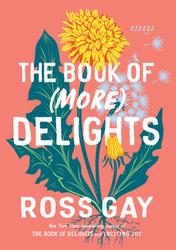 Like many writers, Ross Gay pays attention to things other than nature--but when he turns his keen, joyous, often exuberant attention to the natural world, the result is stunning. An avid community gardener, as well as a fruit lover and general enjoyer of the world we inhabit, Gay often features nature's gifts in his two essay collections, aptly named The Book of Delights (Algonquin, $18.99) and The Book of (More) Delights (Algonquin, $28). With titles like "Garlic Sprouting," "Sweet Potato Harvest," and "The Purple Cornets of Spring," Gay's rambling, big-hearted sentences, bursting with asides and digressions, make me want to grab a pen and scribble down my own rambling tributes to snowdrops, budding maple trees, the sound of icicles melting off my neighbor's eaves, and the pinkish-gray mourning doves that sun themselves on my kitchen windowsill this time of year.
Like many writers, Ross Gay pays attention to things other than nature--but when he turns his keen, joyous, often exuberant attention to the natural world, the result is stunning. An avid community gardener, as well as a fruit lover and general enjoyer of the world we inhabit, Gay often features nature's gifts in his two essay collections, aptly named The Book of Delights (Algonquin, $18.99) and The Book of (More) Delights (Algonquin, $28). With titles like "Garlic Sprouting," "Sweet Potato Harvest," and "The Purple Cornets of Spring," Gay's rambling, big-hearted sentences, bursting with asides and digressions, make me want to grab a pen and scribble down my own rambling tributes to snowdrops, budding maple trees, the sound of icicles melting off my neighbor's eaves, and the pinkish-gray mourning doves that sun themselves on my kitchen windowsill this time of year.
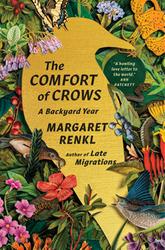 Lastly, Margaret Renkl, well known for her columns in the New York Times, decided to spend a year paying attention to the natural world during the Covid-19 pandemic. Her third book, The Comfort of Crows (Spiegel & Grau, $32), is the result: a luminous collection of week-by-week essays combining observations of nature with thoughts on her own inner life. Gorgeously illustrated with intricate collages by Renkl's brother, Billy Renkl, The Comfort of Crows (or any of these books) would be an excellent companion not just for spring, but for any season.
Lastly, Margaret Renkl, well known for her columns in the New York Times, decided to spend a year paying attention to the natural world during the Covid-19 pandemic. Her third book, The Comfort of Crows (Spiegel & Grau, $32), is the result: a luminous collection of week-by-week essays combining observations of nature with thoughts on her own inner life. Gorgeously illustrated with intricate collages by Renkl's brother, Billy Renkl, The Comfort of Crows (or any of these books) would be an excellent companion not just for spring, but for any season.

